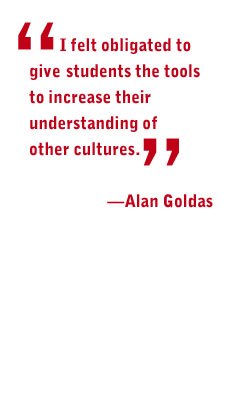


Improving Global Understanding, One Bias at a Time
by Lindsey Scott


When he began teaching Islam and world religions, Alan Godlas, director of the University of Georgia’s Virtual Center of Interdisciplinary Studies of the Islamic World, like many others, asked students first to try to put aside their own biases.
He found that for many students, that was about as reasonable as asking them to step outside of their shadows. After a few years, he realized that if he were to succeed, he must first help students understand their own biases before concentrating on the beliefs of others.
“So much of the unnecessary violence in today’s world comes from a lack of intercultural understanding," Godlas said. “I felt obligated to give students the tools to increase their understanding of other cultures.”
Godlas says understanding the true nature of Islam and what most Muslims really believe is vital in today’s global society. The religion is followed not only in the Middle East, but in practically every country of the world. Here in the United States, Islam is the second most-practiced religion — and the fastest growing.
In 2001, he established the Virtual Center of Interdisciplinary Studies of the Islamic World after receiving support from UGA president Michael Adams’ Venture Fund. The virtual center aims to attract research funding for studies of the Islamic world, its countries or Muslims. The Web site aims to educate and increase collaboration among the academic community.

“Initially, I developed my Web site as a way to help educate my students,” he said, “but after 9/11, I started getting more and more hits and a great deal of media coverage.”
Driven by a sense of responsibility “not just to my students but to the residents of Georgia and the rest of the country,” Godlas continues to update the site to keep the public informed.
His teaching method — which he calls “hermeneutical understanding,” referring to the branch of philosophy concerned with interpretation — involves students in a process that helps them to understand how their own biases make sense. Godlas said that once students learn this method for becoming aware of the lenses through which they view the world, their biases are more likely to inform rather than obscure their understanding of other cultures. This establishes a context and a set of tools for addressing how their understanding of another culture — such as Islam — interacts with their view of themselves.
One aspect of this method involves understanding beliefs historically, while another involves learning to see how a single belief fits within the other beliefs of a cultural system. As a result, Godlas said, “students' abilities to analyze cultures are enhanced.”
Godlas’ teaching theory could have policy implications as well. A process for teaching students a more comprehensive way of understanding others’ beliefs and positions might also be used by international or homeland security officials in formulating policies for, say, counter-terrorism efforts. “It can help guide both foreign and domestic policy by assisting officials in distinguishing between, on the one hand, ideologies of radical Muslim groups, and, on the other hand, those Muslim groups — which constitute the vast majority — that are not a threat,” Godlas said.
Godlas is currently working with the university to turn the Virtual Center of Interdisciplinary Studies of the Islamic World into the Institute of Interdisciplinary Studies of the Islamic World, which would offer a certificate in Islamic studies. He hopes to hold the first class next year and eventually hopes to develop degree programs for a minor and major in the field.
For more information, access http://www.uga.edu/isiw/.
For comments or for information please e-mail: rcomm@uga.edu
To contact the webmaster please email: ovprweb@uga.edu
![]()